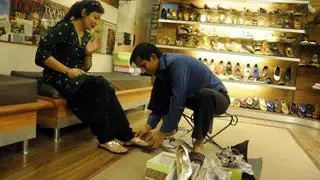Hercule Poirot was born exactly 100 years ago. In October 1920, Agatha Christie introduced this Belgian detective to the world, in her first ever crime novel, The Mysterious Affair at Styles . He had an egg-shaped head, and an enormous, luxurious moustache. He was arguably eccentric, and loved neatness to a ridiculous degree. None of these are aspirational traits. Yet Poirot continues to remain a strong brand today, appealing equally to elderly and millennials.
Consider these facts. Just three years ago, the 2017 movie remake of Christie’s novel, Murder on the Orient Express featuring Hercule Poirot, raked in over $350 million. Encouraged by this success, a grand remake of another Poirot movie, Death on the Nile , is scheduled for release this year. He is the only fictional character whose obituary has been carried on the front of The New York Times .
The latest novel starring Poirot, The Killings at Kingfisher Hill (written by Sophie Hannah, who has been commissioned by Agatha Christie’s estate) has just been launched. And, mon dieu , here is a figure that would excite even Poirot himself — Agatha Christie’s books sold more than two million copies last year alone! A significant proportion of these are Hercule Poirot novels.
So what makes this short, eccentric detective such an evergreen brand, living and thriving after an entire century? Here are some clues that may offer you a solution to this mystery.
Great intelligence
The core of brand Poirot lies in the little man’s unsurpassed intelligence. All of us aspire to be intelligent, and Poirot’s “little grey cells” are extraordinary. Unlike other detectives, he does not run around here and there, frantically searching for clues. Instead, he uses his intelligence to gently but surely probe the psychology of all the characters present. He then uses these sharp probes to develop an entire jigsaw puzzle of all the human nature he is confronted with. This is far more important to him than pieces of physical evidence — which also he occasionally takes into account — to eventually solve the crime.
As Poirot himself says: “I do not need to bend and measure the footprints and pick up the cigarette ends and examine the bent blades of grass. It is enough for me to sit back in my chair and think.” The desire for intelligence is timeless, and I think each of us aspires to use a Poirot-type of quiet intelligence in our own lives — perhaps not to solve murders, but to resolve everyday events. That makes his appeal timeless too.
An outsider, like us
Hercule Poirot is an outsider, a Belgian and a foreigner, in virtually every situation in which he finds himself. He, therefore, examines the crime from the viewpoint of an outsider — just like we, the readers, do. That is a master-stroke by Agatha Christie, because it immediately binds Poirot and the readers together. In very few other mystery novels do we feel such bonding with the detective hero, in this way.
Sherlock Holmes belongs to his own Victorian London, James Bond is integral part of the world of spies, Feluda is a Bengali solving crimes primarily in Bengal or Eastern India, and even Christie’s own Jane Marple is an Englishwoman solving crimes in English villages. They are all insiders, in sharp contrast to Poirot. Christie takes this bonding a step further by giving readers the same clues that she provides Poirot. And so there we are, both outsiders trying to unravel the crime together, with the very same information.
In this sense, does Poirot appeal so much because he is a reflection of ourselves, and therefore provides us the wonderful vicarious pleasure of living through the exciting crime-solving voyage?
Endearing mannerisms
Much like the superstar Rajnikant in Indian cinema, Hercule Poirot brings along with him many unique mannerisms which endear him to us. Here is a partial list. His immaculate and enormous moustache, which he nurtures so carefully. An incredibly neat attire, without a single particle of dust on it. His refusal to eat eggs of different sizes for breakfast because they signal to him a disorderly conduct of the hens. His marked preference for exotic sirops such as the crème-de-menthe.
These mannerisms of Poirot’s are harmless but loveable, and they constitute a brilliant outer packaging that holds an equally appealing core product.
Truth always wins
Most of all, brand Poirot holds universal appeal because it stands for the victory of truth over evil. We love that. He solves every single mystery, and nails every murderer without fail, however complex the plot is, and however unappetising the solution may be. None of us who have read novels such as The Murder of Roger Ackroyd or Evil under the Sun can come away unimpressed with his persistence in unearthing the absolute truth. Poirot himself says: “Understand this. I mean to arrive at the truth. The truth, however ugly in itself, is always curious and beautiful to seekers after it.”
Mon ami , if you are a student of marketing, you can also seek out some timeless truths of brand building, in all these clues to Hercule Poirot’s longevity.
Harish Bhat is Brand Custodian, Tata Sons. Views are personal








Comments
Comments have to be in English, and in full sentences. They cannot be abusive or personal. Please abide by our community guidelines for posting your comments.
We have migrated to a new commenting platform. If you are already a registered user of TheHindu Businessline and logged in, you may continue to engage with our articles. If you do not have an account please register and login to post comments. Users can access their older comments by logging into their accounts on Vuukle.